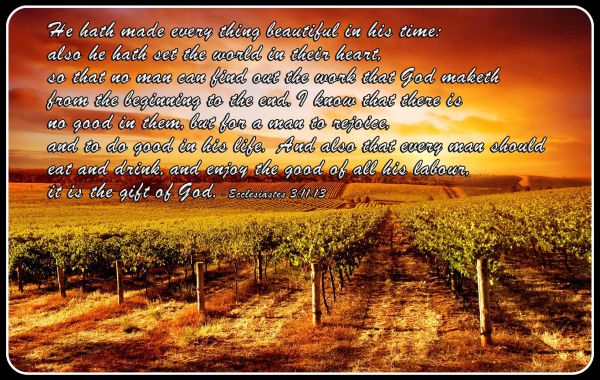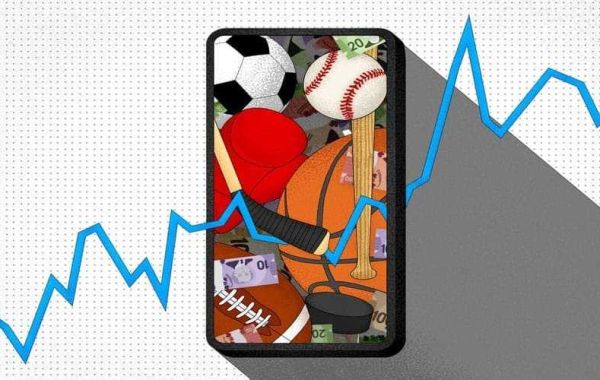I have seen the travail, which God hath given to the sons of men to be exercised in it. He hath made every thing beautiful in his time: also he hath set the world in their heart, so that no man can find out the work that God maketh from the beginning to the end. I know that there is no good in them, but for a man to rejoice, and to do good in his life. And also that every man should eat and drink, and enjoy the good of all his labour, it is the gift of God.
Solomon Now Sees God's Purpose
His answer to vs. 9 is the next verse. “I have seen the travail which God has given.” This word travail means labor, work, task or we could understand it as purpose. And in vs. 11 Look at what burned out Solomon says is God’s purpose.
Ecclesiastes 3:11 He hath made everything beautiful in his time: also he hath set the world in their heart. What?!? He has made everything beautiful in his time?
Is this the same guy who told us everything is worthless in the first 2 chapters. Here is the turning point for Solomon as he moves back toward God and away from world’s debauchery, anti-widsom and apathy. He isn’t fully there yet, but he is on his way.
He begins to see that in God’s times and seasons there is a beautiful harmony. When he acknowledges that God is in charge, then times and seasons begin to make sense, things begin to work out and there is a plan and a purpose to everything under heaven.
He adds that God has set the world in their heart. The idea here is that God has put in every person’s heart the sense of eternity, of something beyond our world and beyond our time in this world. We can glimpse God and sense eternity, but we can’t ever fully comprehend it in its entirety without His revelation of Himself.
He remarks in vs. 11 that, “no man can find out the work that God maketh from the beginning to the end.” We can’t ever fully understand the eternity of God or even fully the times and season of God, but
Solomon says this, "I know" in vs. 12. So, what in all this plan and purpose of God and in the glimpsing of eternity can Solomon possibly know?
He states, there is no good in man or his labors. If we stopped here, we’d be right back to where we started but he doesn’t stop, he goes on, no good in man except this, “for a man to rejoice and to do good in and with his life. Eat, drink live your life and enjoy the good of all his labor, it is the gift of God.
Now this sounds a little like the path Solomon began to walk in chapter 2 or the foolish man who in Luke 12:19 "Soul, thou hast much goods laid up for many years; take thine ease, eat, drink, and be merry." What is the difference?
In chapter 2 it was Solomon doing all those things without acknowledging God, just like the rich fool in Luke 12, the difference in Chapter 3, is in acknowledging God in all things. All these things, wisdom, knowledge, labor and living only make sense through and by knowing God and accepting from His hand the gift of the working through the times and seasons of life. These things are the gift of God through His plan and purpose.
So that leaves us with a personal question…
Understanding God’s Times and Seasons In My Life?
Will I submit my understanding, my faith, my fear, my doubts and my hopes, , and my labor to God’s plan and purpose? Can I see all things in my life as beautiful in their time? Can I submit even my heartaches, pain and sorrow to God’s purpose?
If I can then ultimately, by faith, I will see even the mundane things, and the hard things as beautiful if I know God is working His purpose through them in my life. I will never understand completely but I can know He is working in my life, even with its worst pain and suffering. He can make everything beautiful.
What did Joseph say to his brothers when they realized who he was and what they had done? Genesis 50:19-20 Joseph said unto them, Fear not: for am I in the place of God? 20 But as for you, ye thought evil against me; but God meant it unto good,
Let me tell you of two men who learned the lesson of God’s Times and Seasons
Eric Liddel was world famous Olympic athlete who refused to run on Sunday during the 1924 Olympics, events that were portrayed in the movie, Chariots of Fire. Later as a missionary in China he died in a concentration camp when Japan invaded during WWII. Liddel could have left but he chose to stay behind and help those who had no hope of escape.
"Circumstances may appear to wreck our lives and Gods plans, but God is not helpless among the ruins. Our broken lives are not lost or useless. God's love is still working. He comes in and takes the calamity and uses it victoriously, working out his wonderful plan of love." - Eric Liddell in Disciplines of the Christian Life. Christianity Today, Vol. 38, no. 9.
Dave Dravecky was a professional baseball player and top pitcher in the MLB. A small bump on his arm was diagnosed as cancer. After months of treatment he made it back to the mound only to have his arm break in his second major league start. Later the arm had to be amputated to stop the cancer. “I have learned that God's silence to my questions is not a door slammed in my face. I may not have answers. But I do have Him.” - Dave Dravecky in When You Can't Come Back. Christianity Today, Vol. 38, no. 12.
If these men could see God in the times and seasons of their life, if they could rejoice in that knowledge, then so should we in our own times and seasons.
Cerca
Post popolari






